If restaurant servers are the hands and legs of the restaurant, then chefs will be the hearts and brains. Without chefs, there will be NO food to serve the customers. Chef turnover is a major concern for most restaurants.
Besides embracing the hot temperature in the kitchen and frequent customer criticisms, many chefs are not well treated. Unsurprising, we are experiencing the annual chef turnover rate at 63%, and more chefs don’t stay on the same job beyond 18 months. Many chefs either job hopped or changed profession after a few years on the job. Globally, there are more than 1 million job openings for chefs at any point in time, and the pace of culinary students graduating to fill these vacancies are far from enough.
The number of chefs and job segregations among chefs is not as distinct between small- and medium-size restaurants as compared to the chain- and larger-size restaurants. Chefs working in these smaller restaurants are expected to double or triple the workload and multitask as compared to those larger restaurants.
For the consistency of food quality and survival of the restaurants, let’s take a closer look into some effective ways to minimize the chef turnover rate
Hiring Chef
How to better identify chefs with potential?
Given the wide food varieties, it is challenging to identify chefs with the right skill set. I mean, a chef with superb skills on a dish may not cook well for other dishes. Not to mention the wide varieties most restaurants are offering, it does take a different view to identifying the right chef for the job. I don’t see this chef recruitment as an easy task.
However, given that many restaurants serve cuisines of similar culture, I would say that this can be easier for recruiting chefs of the same cultural cuisine. For example, if your restaurant is focused on beef steak, you can easily identify chefs that have the grilling skills on lamb, pork, and chicken chops.
Given that the style of cooking is similar, you need to be creative in identifying the potential source of chef expertise in your recruitment. There is no straight answer here, but try to conduct as many interviews as you possibly can to narrow down your potential chef candidates. Be creative and take some risks if you can’t find the right chef with the right skill set and experience.
Another possible way is to start with trainee- or commis-chefs, provided if you have the time to provide adequate training.
What about chefs’ qualifications?
LOL, everyone can be a cook, but not many can be a chef. Qualifications do help with the knowledge and skill set exposure of the potential chef, but mastering a dish takes years of practice and experience. I wouldn’t recommend too much about getting into the qualification as a criterion, but it’s good to have, not a must-have.
I owned a restaurant for a few years to know that each chef cooks the same dish differently, and qualification does not matter. When I say different, I mean the final taste of the dish will deviate from chef to chef. So, in finding the right chef, it is equally important to have a dish manual to standardize food ingredients and preparations for every dish.
What about chefs’ experience?
Oh, this is another exciting factor, because the chef’s experience can work for and against you. For the same dish, it tastes different in every restaurant. So, the chef’s experience is important to bring a little fresh perspective to the customer, but try not to be too creative for a start. Otherwise, you might end up losing some key customers for good.
But, if the chef is too experienced, the dish may end up tasting too different than what the restaurant is offering. Your customers may not get used to it. Additionally, an experienced chef might bring some undesirable habits into the kitchen.
I would recommend caution, especially in hiring a chef with too much experience. I have seen this too many times that it backfires on the restaurant. The kitchen is also another political place to be, so I recommend that you have more controls in place to ensure food quality and never to be taken hostage by any chef, especially when the chef gets too popular with your customers. Sorry chefs, I do have to bring up this issue, which has bitten me for many years.
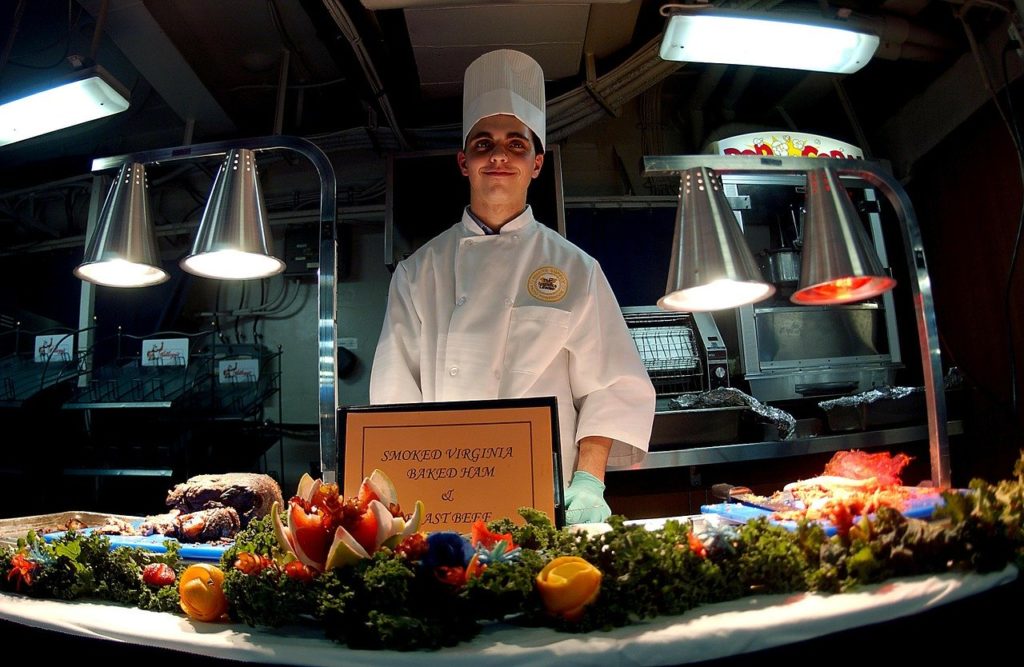
What about chefs’ culinary expertise?
I would recommend looking for a chef with more than the required expertise. Most chefs possess the skills of cooking many different dishes, which it’s all good. Upholding the food standard is of utmost importance in the kitchen.
Even if the chef has the experience of cooking those dishes required, I strongly recommend a standard guide on the ingredients, fire or temperature control, etc. Now, if the chef has the potential to provide a new dish on the menu, then that’s great! The restaurant gets to have a new dish.
But wait, things don’t work this way. You must think about customer acceptance of the new dish and continuity. You can check out customer acceptance by randomly serving some customers with that new dish and ask for feedback. But for continuity, ensure other chefs can replicate the dish should the new-dish-chef decides to quit.
What about the culinary expectations of new chefs?
It is unfair to hold high expectations of new chefs, given that they are new to the kitchen and team. I recommend new chefs to familiarize themselves with the 2nd line of food dishes that are not as popular. New chefs should start somewhere and getting them started on the not-so-popular dishes is a way to transition them into the kitchen.
Many restaurants have this practice of getting new chefs to prepare the non-popular dishes for a start. I would recommend this practice too. Have some food tasting internally among the servers and chefs, get some feedback before serving the customers. It’s easier to make internal corrections than external damage.
Should you do a background check on the chef?
I strongly suggest doing background checks on your chef before making the hiring. This is an important step that you should never miss, but again, a great number of restaurants intentionally missed or ignored this step due to an urgent need for chefs.
But if you have the luxury to do so, do check with their ex-colleagues on helpfulness, teamwork, potential family problems, cooking style, bad habits, etc. Weigh the pros and cons before making the hiring decision.
Where should you place recruitment ads for new chefs?
Too many online and offline sources or sites to do so. I would strongly recommend diversifying your sources to avoid getting too many potential chefs of the same demographic background.
I know this is challenging, but try to diversify as much as you can. Getting too many chefs of the same background might pose a potential staffing issue later, such as mass resignations. If this happens, your restaurant is doomed.
Where should you look for the right chef?
Ok, you need to be creative. No straightforward answers here, but I strongly recommend chefs that you look for chefs with passions and heart to serve great food. I have seen many chefs that cook with a smile on their face. Yes, cooking is a hobby and interest to them that they find it enjoying. These are the kind of chefs that you should look for, even if these chefs have limited experience. Because with some training, they will pick up the skills and experience in no time.
Secondly, you need to look harder at other restaurants serving close or related dishes. Chefs with dish-related experience is the easiest to train and equip.
Thirdly, check out your servers. Yes, those servers. In my years of restaurant experience, some servers aspired to get into the kitchen. I do have some successful cases.
Lastly, always be on the lookout for intern chefs, even if you have a full kitchen team. These junior chefs will come in handy on rainy days. It’s a cost issue. I know many restaurants don’t have this luxury, but if your operating cost permits, do consider this.
Should you get a referral from your chefs?
This referral option looks good among many restaurant owners taking an easy way out for quick replacements, but the actual cost might hurt when chefs start leaving for other jobs. Or when mentors and seniors start asking their juniors or close friends to join them in their new job.
But I wouldn’t recommend against this option too but be in control to ensure that any fallout will not affect staff morale and business operations. Should you decide to go for referrals, do have some cash incentives in place?
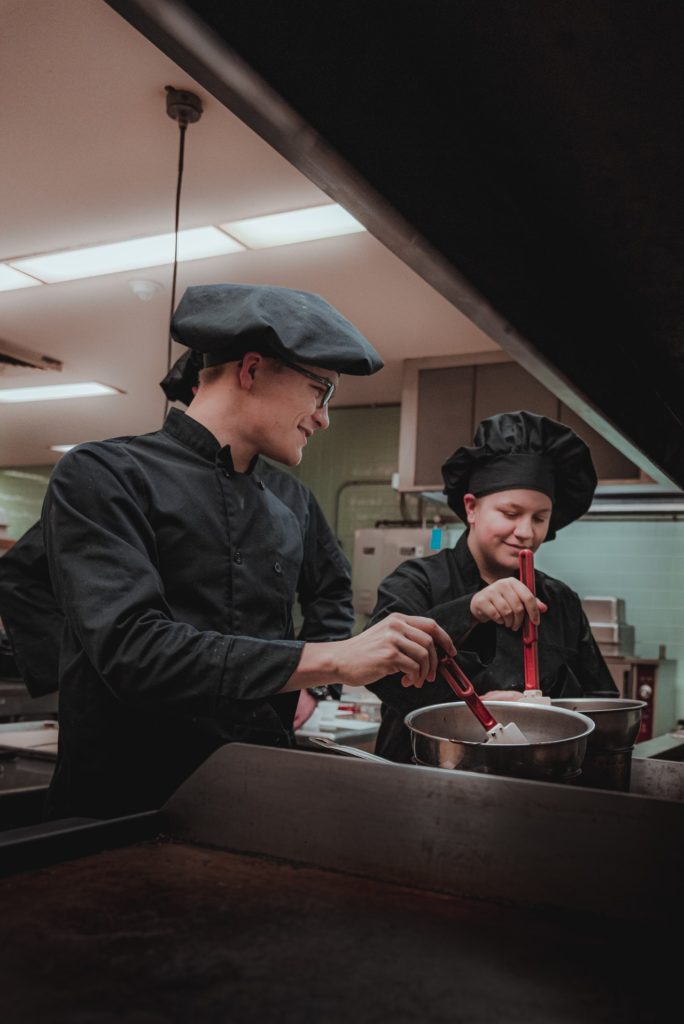
Should you source new chefs from your competitors?
The answer varies greatly. On the positive note, if the new chef commands some loyal customers, then headhunting makes absolute sense because you acquire new potential customers too. But this comes at a cost because your competitors might be doing the same against you too. I used to have gentlemen agreements with some restaurants against “poaching“ to minimize business disruptions and raising chef wages.
On the con side, sourcing comes at a higher wage, which may cause existing chefs to be jealous. This can cause friction among chefs. This wage gap issue bit me and caused more than half my chef team to leave within six months. So, be conscious and cautious about this issue.
So, it’s a human issue to handle, and the situation varies from time to time. Be sure to get some buy-ins from the head and chef group before hiring.
Should you hire junior chefs or train interns?
Absolutely. As I mentioned earlier, this is a must if you have the spare budget to do so. Always be prepared for the rainy day and a backup in case of a mutiny in your kitchen. Yes, I mean a mutiny. I had experienced several times when too many chefs called in sick on the same day for a few days. It’s their test and protest in silence. So, having some interns will help to cushion the disaster.
You should never be taken hostage in any situation. So, the junior chefs will come in handy when the senior ones create trouble. But during peaceful times, these junior chefs can take on some “dirty” jobs as part of learning and training from their seniors.
Chef’s Job Trials
Should the new chef cook for a food tasting trial?
Cooking for a food tasting trial is a must. Perhaps during the interview, which I will usually schedule during off-business hours, to get the chef to cook his/her special dish. The food tasting should involve other chefs and servers too. Well, I understand this trial may not happen in the first interview, but in your comfort to make the necessary arrangement.
As much as possible, you should get the new chef to cook those dishes on your restaurant menu. This will test the culinary standard and what sort of training to bring the new chef up to speed. If the new chef can cook several dishes on your menu and up to restaurant standard, then you are in for an easy time. So, I will leave this to the new chef to impress you.
Who should you consult before hiring the new chef?
Depending on the seniority of the chef, the hiring decision should involve the peers (other chefs), head chef, and shareholders (if it’s a small restaurant). These decision-makers should be informed about the background and credentials of the chef, background checks and should take part in the food tasting too.
If possible, a collective decision will minimize any potential concerns or backlash in the future. In my case, I involved my head and senior chefs. This insures me against future disputes and assign the responsibilities to guide the new chef to them. Again, this practice varies from restaurant to restaurant, and do exercise precautions to prevent any potential conflict in the kitchen.
Should the new chef be tested in food preparation?
Excuse me if I am not clear about this question. I mean about preparing the ingredients before cooking. This includes washing, cutting, and seasoning, the raw ingredients before cooking the dish.
In culinary preparation, the knife cutting skill is highly valued, especially in Asian restaurants. The more seasoned the chef is, the better is the knife skill. Other cultural cooking requires different skill sets. So, I strongly recommend the new chef to be tested on ingredient preparations, but I will leave this point to your discretion.
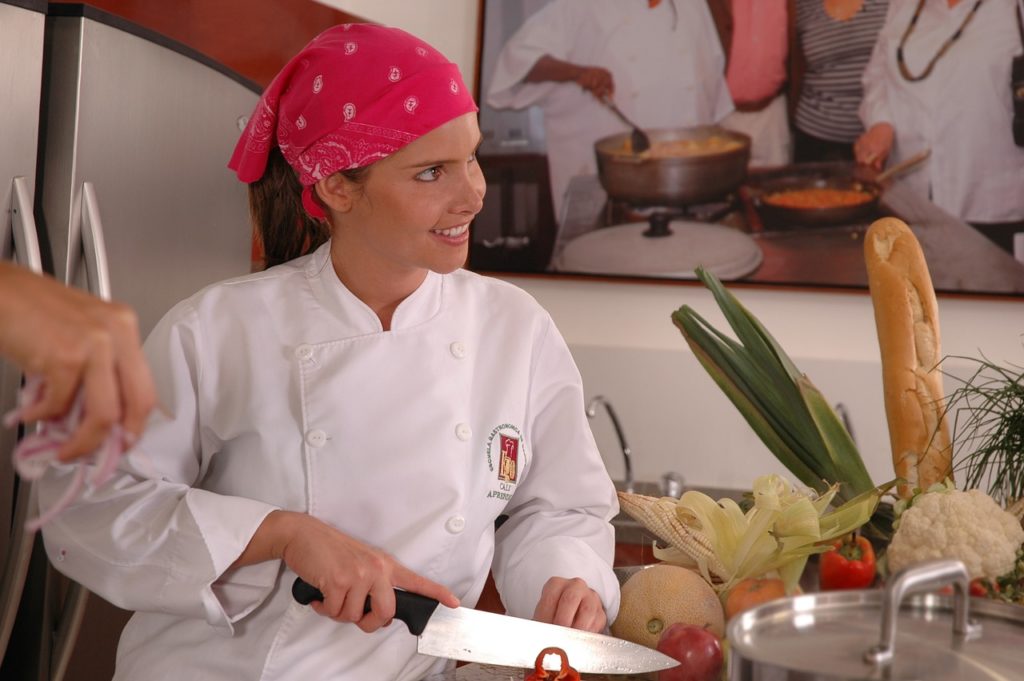
Should there be a trial period for the new chef?
I recommend a trial period before confirming the chef. The trial period can last between a few days to a few weeks based on restaurant requirements. I know some chefs might not agree with the trial period, but for mutual benefits, a short trial period will do some good for both sides.
Back in my days, I used to have a week’s trial before hiring. Unfortunately, this trial can only take place if the chef has left the last employment. In many situations, it is not easy to get the new chef for a trial period but do ask for it.
Hired – Chefs’ Probation Period
How long should the probational period be?
Congratulations, you have hired the new chef after the trial period. There is no hard and fast rule on the probational period for new chefs, and this varies from restaurants to restaurants. Typically, the industry practice is between one to three months, and I know some high-end restaurants are going on six months. During probational periods, I recommend your new chef to focus mostly on the less popular dishes.
It’s better to start slow, and gradually entrust your new chef with more workload. For example, some restaurants will not allow new chefs to cook any main course until the probation period is over. Additionally, the head chef should provide closer supervision, guidance, and mentoring to ensure food standards and procedures are met.
How much should you entrust the chef with the cooking?
I don’t have a straightforward answer here because it varies from restaurant to restaurant. Why? Because it’s your restaurant’s reputation at stake. If the new chef produces a low-quality dish that displeases your customers, then you will be losing some customers for good.
So, it’s better to take small baby steps here. You can entrust the new chef to cook the dish, while the head chef acts as the judge through a small portion of food tasting before serving the dish. Repeat a few times till the head chef is fully satisfied. Similarly, I will encourage the new chef to do food tasting before serving to get that perfect dish.
How to get the chef up to speed and maintain the food standard?
Nothing beats more than trial and error before getting to the required standard. I must emphasize food tasting is important. To play safe, get the food tasted by other chefs and servers. Just cook a larger portion than required to ensure quality. The maximum damage is only the food ingredients. Other chefs and servers might offer valuable advice to improve food quality.
Next, encourage the new chef to check with the customers. Yes, I mean allowing the chef to talk to the customer. I know many restaurants do not have such a practice, but it has proven effective in my case. Ultimately, the customer is the consumer. If the customer says the food is good, then it’s good. Check with a few more customers to gather more feedback.
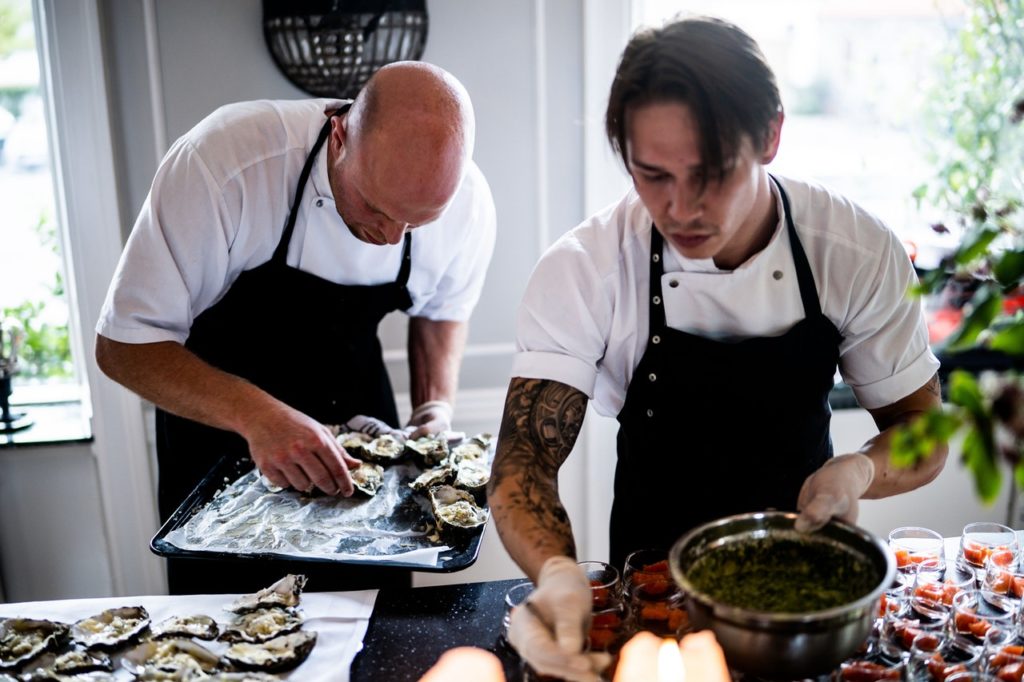
Hired – Chef’s Training
How to equip the chef on the restaurant offerings?
The head chef assigns dish responsibilities to each chef. Simply, it’s just a matter of who cooks what. Now, I am assuming the restaurant to have the right number of chefs, customer orders evenly distributed across different food items found on the menu. So, each chef will cook their portion equally. Well, in real life, things don’t work this way. LOL, I know.
Mathematically, based on the number of chefs, and the total number of food items on the menu, you will get the number of dishes per chef. For example, if there are 50 food items on the menu, and you have five chefs, technically, each chef gets to cook ten different dishes. However, customer orders are unpredictable. If 50 customers get into the restaurant and order the same dish, this means the chef will overwork, while the other chefs idle. So, we can’t work this way.
Depending on the equipment and cooking wares available, restaurants should assign two or more chefs per food item on the menu. In the same example above, the five chefs should be equipped to cook more than 20 food items on the menu. The same rules apply for training and food tasting effort to ensure food quality standards are met.
Additionally, the restaurant should invest more cooking wares so that all chefs get fully utilized at any point. I understand more cooking wares will take up more space in the kitchen, which is occupying valuable table space for customers. But this is your decision. If the customers get annoyed due to waiting time, then you will lose them for good.
Unfortunately, the structured lines of chefs in larger restaurants couldn’t be more flexible to my examples. Each Chef de Partie has their specific roles as butcher, fish, fry, grill, pastry, pantry, etc. So, unless cross-training happens, otherwise, the skill specification will cause a longer customer waiting time.
Should new chefs be tasked to prepare those raw ingredients of each food item?
Again, this varies from restaurant to restaurant on the preparation of raw ingredients. But as an industry practice, restaurants should either purchase these ingredients, cut out in proportion or have the chefs and servers to prepare. Every new chef should know the right amount of raw ingredients per serving.
Many restaurants have the machinery to slice the meat and vegetables into the required size. But chefs working in smaller restaurants may have to do it manually. To speed up the preparation of raw ingredients, the head chef should enlist the help from servers whenever possible.
For the mid- and larger-size restaurants, each line chef is responsible for preparing their own set of raw ingredients.
What about the cooking process for new chefs?
Every restaurant should have its own set of dish cooking process that includes the ingredients (and preparations), the use of cooking wares, procedures of cooking, etc. Unfortunately, too many restaurants don’t have the luxury to do so, or the chefs are unwilling to share. Well, information leakage on specialty dish is also another issue, especially if it’s the best selling dish.
So, without proper documentation, new chefs will have to pick up the skills and knowledge from their seniors. I had come across many chefs that are too reluctant to impart their knowledge and skill. So, the head chef needs to enforce the knowledge sharing whenever required.
I agree some bestselling dishes are too sensitive to be shared, especially for new chefs. So, this takes time and trust. But when the right moment approaches, the senior chefs should equip the juniors with the skills.
What should new chefs handle those nagging servers?
Arrhhh…., it’s painful dealing with those nagging servers, especially when they are getting pressure from the customers. Unbearable waiting time, poor food quality are common complaints directed to the chefs. So, servers never hesitate to pass on that pressure to the chefs.
I strongly urge chefs to be honest about the cooking time, and it’s better to give a little time to buffer. If that spaghetti take 15 mins based on queue, it’s better to ask for 20-25 mins. Most customers can gauge their waiting time the moment they walk into the restaurant.
As for customers’ feedback on food quality, be prepared to take it positively as improvement tips. Most customers have a sharp tongue to taste. So, even the slightest deviation to the norm will trigger the alarm.
Chefs should use customer feedback for improvements. On the other hand, some customers might have special requirements. So, servers need to note all customer requirements in order to serve the dish to the customers’ perfection.
Besides these issues, I strongly encourage communications between servers and chefs to be done through the restaurant manager and the head chef. Any issues raised by the servers should be directed to the restaurant manager, and it’s up to the manager to address them with the head chef.
So, good luck with handling the servers, because new issues will pop up every day!

What about the interactions among chefs?
You should encourage frequent communications among chefs, but be aware of politics. I have seen too many cases in the kitchen. Well, a lack of sleep and constant heat do add things up, and this explains why some chefs are temperamental.
The head chef should always be approachable. All chefs should approach the head chefs whenever there is an issue.
Discussions among chefs can either be work- or non-work-related issues. Jokes and fun moments do help to close the gap between chefs. It’s not always about work.
Hired – Chef Operational
What about the chefs’ wages?
Great, your new chef has survived the probational period and should proceed to undertake heavier responsibilities without further supervision. So, how should your chef be compensated? There is NO standard answer to this question, but it also depends on how much you value your chef.
All chefs work for money, to pay their bills, put food on the table, plus any other leisure-based activities and some savings for the rainy days. You should compensate your chefs based on industry standards and their years of experience. Additionally, I strongly suggest sharing some business profits whenever possible.
Chefs don’t face customers and are unlikely to be tipped. So, when deciding the wage, you must balance their wage against those servers which are more likely to receive customer tipping.
What about the chefs’ working hours?
Most restaurants are open more than 8 hours daily. Its either the chef works more than 8 hours, or you should have two shifts to handle the day’s operation. Well, during the off-peak hours, you can assign chefs to work on shifts. For example, chef A gets to cover for Monday, chef B for Tuesday, and chef C for Wednesday. By Thursday, chef A gets the duty call. This shift rotation helps to rest your chefs whenever possible.
Similarly, you can schedule your chefs to go on full business hours, but resting them on some weekdays. Chefs need to stand in the hot and stuffy kitchen, which may potentially lead to the development of cardiovascular diseases or high blood pressure.
I sincerely urge you to be more humane in handling your chefs. Encourage chefs to take a break for fresh air or get a seat whenever they are free from cooking.
How to manage internal chef conflicts?
Omg! Internal conflict is a sensitive topic. Even best friends quarrel, let alone chefs. The textbook answer is always an impartial way to deal with these conflicts. But sometimes, your head chef is biased. Many chefs leave their job because they couldn’t work harmoniously in the kitchen, and neither the head chef can help.
So, I encourage you to investigate the problem without bias and advise or mitigate the conflict accordingly. At times, the solution might be bitter, but business priority comes first. You should try to be as accommodating as humanly possible.
What about sharing customer tipping with chefs?
I know many chefs have raised this issue, but could never get a satisfactory response. The fact is, many restaurants choose to keep customer tipping just among the servers. If this is your restaurant’s practice, I urge you to factor it when deciding your chefs’ wages.
However, I know of cases where customers tipped the chefs after a great meal. In these direct cases, the tipping should go to the chefs, but under normal tip cases, it’s up to your restaurant’s policy on sharing customer tipping with chefs
Should you encourage the chefs to engage customers?
Well, I always encourage my chefs to interact with customers whenever possible. Especially when there were no pending customer orders, the chefs could take a short break away from the kitchen and engage the customers — two birds one stone.
Even if there are customers’ orders, you should allow your chefs to take a quick break away from the kitchen and have a quick conversation with the customers. Of course, this is not idle talk, but to get customers’ feedback on improvements. Getting some customer reviews for chefs and the quality of food will be a good start
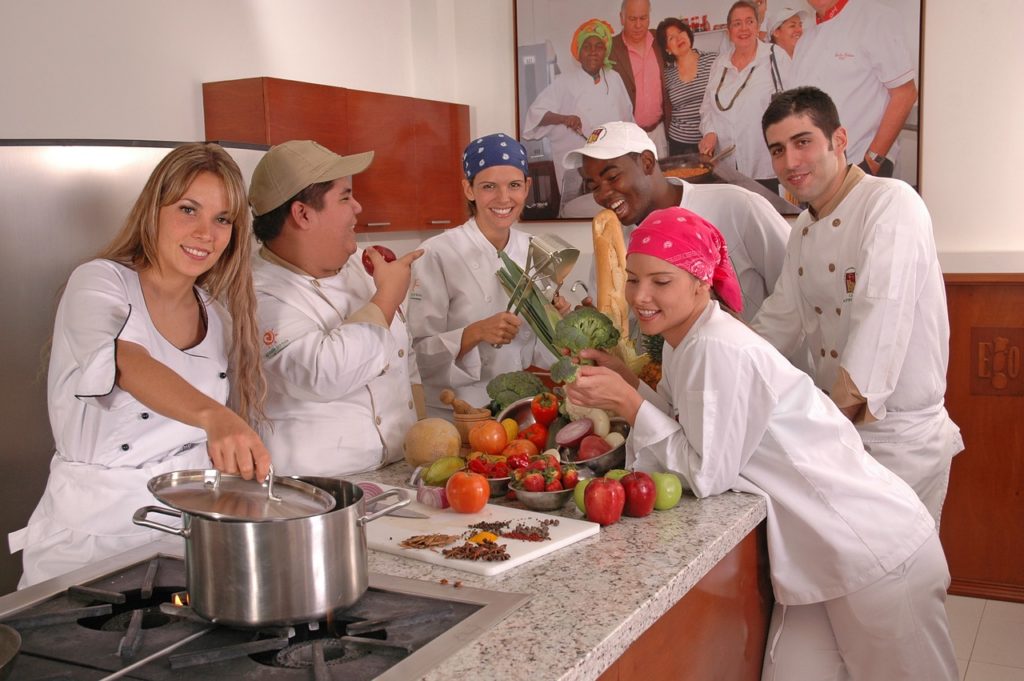
What about the bonus for chefs?
The food and beverage industry is a very challenging landscape, where restaurants face challenges from macro and microeconomics. From a macro standpoint, many restaurants are directly dependent on tourism-related activities, which proves to be seasonal in terms of business operation. From a micro perspective, competitions are merciless and unspoken among restaurants.
Many restaurants operate on a thin profit margin. I strongly encourage you to share some part of the profits with your chefs whenever possible. All businesses should save sufficient to weather the rainy days, but be generous enough to share some profits with the chefs. They have worked hard to prove their loyalty and worth, and you should compensate as much as financially possible.
I have seen many small and medium restaurant owners offering a profit-sharing scheme with their head chef. You should consider this option too since the head chef is the anchorperson in the kitchen. Additionally, you might want to consider the same scheme with the chefs or have the head chef to share among the chefs — just a suggestion.
What about other work incentives for chefs?
Getting up to work on schedule, punctuality, and not taking any sick leave are possible performance measurements that warrant incentives to be given to the chefs on a monthly or quarterly basis. Medical, dental, and hospitalization cost reimbursements are part of employee welfare that you should consider providing appropriate medical insurance for your chefs.
These welfare perks add up as incentives to display appropriate tangible care for your chefs. You must be creative to incentivize your chefs whenever possible, to encourage and reward a positive working attitude and quality cooking.
How about ongoing training for chefs?
Your head chef or you should always consider training for your chefs, either internally or externally. Internal training can be in the form of cooking skills improvement, mutual learning, or trying to perfect a new dish. This will help to inspire creativity and learning among chefs, with the potential to add new dishes to the menu.
For any external training, I strongly recommend your head chef to take that trainee spot and return as a trainer. So, knowledge retention, saving some training costs, and maximize sharing. Win-win for all.
What about a lousy head-chef?
It’s hard to prove that your head-chef is lousy. Specifically, lousy in terms of what? Food quality, managing chefs, biased, etc.? Well, you will know when the turnover rate of your chefs gets higher. You should always conduct a chef exit interview to determine the root causes and resolve the issues before things get worse.
I have seen too many common causes on continuous cooking, biased, favoritism, etc., that bring unbearable pain to the chefs that caused their departure. So, be sure to step in whenever required. You can’t afford anything less than a 100% efficient and effective kitchen to produce quality food to satisfy your customers.
Should you encourage chefs to take frequent short breaks?
Well, I have covered some parts of this point earlier and will highlight the harsh kitchen environment. Chefs work in a hot and stuffy kitchen that potential cause high body temperature, and cabin fever in the long term. Be kind to offer free drinks to your chefs at any time. The liquid will cool and relax their body to continue preparing those dishes for your customers.
Breaks to interact with customers are positive feedback for chefs, which will improve food quality and boost customer confidence. Schedule and rotate off-peak operating hours break for your chefs whenever possible. Be creative to schedule maximum possible breaks without affecting your business.
What about free beverage consumption for chefs?
I strongly recommend free beverages for chefs during their working hours. These drinks should include all bottled mineral water or soda. During my restaurant days, I offered some free beers for our chefs. Yes, it’s beer. Of course, I limit the consumption of beers for cleansing their taste buds for food-tasting and cooling their bodies in the hot kitchen.
Consuming a small amount of beer is good. It helps to boost the chefs’ morale and deemed as a little perk for their hard work. That’s your call.

What happens when the chef loses interest?
Things get challenging when a chef loses interest in his/her work. All chefs should always approach their head chef for any issues as their chain of command. If the head chef couldn’t provide a piece of meaningful advice or solution, then your head chef should refer the issue to you. Unfortunately, at this stage, your chance of losing the chef gets higher. Well, you should appreciate the opportunity to resolve the issue. Yes, I know it’s painful and demoralizing, but chef problems are always a part of the business.
Should you get the opportunity to speak with the chef before his/her resignation, be creative and flexible to address the concerns. I received too many requests asking for a pay rise. It’s a full balance of the chefs’ contributions, the amount of wage raise, chef replacement costs, wage difference with other chefs, and if business profit warrants it.
But if it’s other issues, such as people conflict, schedule, boring job, etc., be creative to address these issues. Create some fun in the kitchen. Otherwise, job fatigue will hit you harder.
What about chefs being neglected or underappreciated?
I received frequent chefs’ complaints about being neglected and underappreciated, which seems common to me over the years. This started right from being underappreciated to overworked and underpaid. It’s just the chefs’ way of asking for a pay raise via a complaint.
Chefs feeling neglected can be resolved with a little more attention from the head chef. But underappreciated is a little more challenging, especially if the issue spiral right into a wage discussion.
I used to challenge my chefs for food creativity, and they love it. The challenge called for their creation of food dishes, which were offered to customers on a promotional period. I would place stickers on the menu to draw the customers’ attention. The chefs received extra cash commissions from those dishes served during the promotional period. At times, our sales spiked 30% month-on-month when we had a great dish, and the chefs made some good money. That’s a win-win for the chefs and my business.
Should you care about those customers’ food leftovers?
Ok, I am always curious about food leftovers (on the table). Sometimes, I would food taste when the leftover portion was huge. Any deviation from the standard would get the chef’s attention.
Our servers would check with customers during billing time when leftovers get too noticeable. It’s a good opportunity to rectify any negative customer experience before losing them for good. Should the customer experience turn negative, I would offer a 50% off next visit to avoid losing the customer.
Food leftovers indirectly tell you a lot about customer experience and chef performance. You should pay close attention to this silent problem.

How about customers’ assessments on chefs?
Thank you for your valuable time reading this article. I hope I have provided you with valuable insights to manage your chefs better.
Getting customers’ responses or feedback on chefs can easily be done on a piece of paper or electronic. However, I will like to point out the use of Graz.me – a customer review digital platform that solicits customers’ feedback on chefs. Graz.me is different from other customer review platforms due to its primary focus on people (as a service), instead of products and services.
Graz.me displays your business questions for feedback and award your promotional coupon for return visits. All customer review ratings act as your marketing on major search engines. You can also download all your customers’ contact and send updates or promotions to boost your business.
Beautiful and win-win for all. There is a 30-days Plan to start HERE. A good justification why Graz.me is better than other customer review platforms out there.
Conclusion
Chefs are the hearts and brains of every restaurant. Without chefs, no food gets served. Food quality ensures your restaurant’s survival, and the chefs are fully responsible for that quality. Cooking to that food perfection establishes your restaurant’s reputation and differentiates you from your competitors.
Ensuring a strong team of chefs is one of the most challenging tasks for head chefs, restaurant managers, and owners. Look after the chefs well, and never stop looking for chefs. Be stringent during the recruitment, trial, probation, and operational processes for every new chef. Maintain the food quality and constantly ask your customers for feedback.
Be creative and flexible. When you do these tasks well, I promise your restaurant will do well.
So, good luck with your journey and I wish you all the best. Should you have any questions, feel free to leave your the comments below. Thank you.
Let’s recap what we have discussed here: –
-
How to better identify chefs with potential?
-
What about chefs’ qualifications?
-
What about chefs’ experience?
-
What about chefs’ culinary expertise?
-
What about the culinary expectations of new chefs?
-
Should you do a background check on the chef?
-
Where should you place recruitment ads for new chefs?
-
Where should you look for the right chef?
-
Should you get a referral from your chefs?
-
Should you source new chefs from your competitors?
-
Should you hire junior chefs or train interns?
-
Should the new chef cook for a food tasting trial?
-
Who should you consult before hiring the new chef?
-
Should the new chef be tested in food preparation?
-
Should there be a trial period for the new chef?
-
How long should the probational period be?
-
How much should you entrust the chef with the cooking?
-
How to get the chef up to speed and maintain the food standard?
-
How to equip the chef on the restaurant offerings?
-
Should new chefs be tasked to prepare those raw ingredients of each food item?
-
What about the cooking process for new chefs?
-
What should new chefs handle those nagging servers?
-
What about the interactions among chefs?
-
What about the chefs’ wages?
-
What about the chefs’ working hours?
-
How to manage internal chef conflicts?
-
What about sharing customer tipping with chefs?
-
Should you encourage the chefs to engage customers?
-
What about the bonus for chefs?
-
What about other work incentives for chefs?
-
How about ongoing training for chefs?
-
What about a lousy head-chef?
-
Should you encourage chefs to take frequent short breaks?
-
What about free beverage consumption for chefs?
-
What happens when the chef loses interest?
-
What about chefs being neglected or underappreciated?
-
Should you care about those customers’ food leftovers?
-
How about customers’ assessments on chefs?

One thought on “38 Tips To Minimize Restaurant Chef Turnover Beyond 2020”